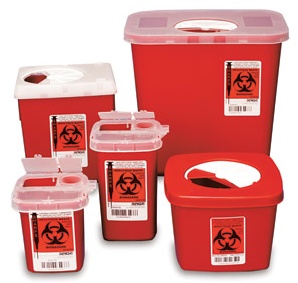Expert Medical Waste Disposal Services: Handling Biohazards
Expert Medical Waste Disposal Services: Handling Biohazards
Blog Article
Liable Solutions: Recognizing Medical Garbage Disposal Solutions
In the world of healthcare, the appropriate disposal of clinical waste is a crucial element that requires mindful factor to consider. The significance of managing medical waste properly goes beyond mere conformity with guidelines; it straight influences public health and environmental security. As healthcare facilities create various types of waste that require customized handling, recognizing the subtleties of clinical waste disposal services is paramount. By exploring the complexities of this essential procedure, we can lose light on the ideal techniques, advantages of specialist solutions, and lasting services offered.
Significance of Correct Medical Garbage Disposal
Correct clinical waste disposal is important in preserving a safe and sanitary atmosphere within medical care centers. In healthcare setups, various types of waste are generated daily, including transmittable products, sharps, ended drugs, and chemical compounds.

Types of Clinical Waste
Within health care facilities, a varied array of waste materials categorized as clinical waste is generated, each needing specific handling and disposal techniques. Pathological waste, which includes cells, body organs, and body components, demands proper disposal to appreciate the dignity of the departed and protect against any biohazards. Recognizing the different types of medical waste is essential for medical care facilities to implement efficient waste administration methods and safeguard public health and the setting.
Rules and Conformity
Medical care centers must stick to rigid guidelines regarding the handling and disposal of medical waste to guarantee compliance with legal requirements and protect public wellness. These guidelines are established to avoid the spread of infections, shield the setting, and preserve the safety and security of medical care employees and the public. Various regulative bodies, such as the Epa (EPA), the Occupational Safety and Health And Wellness Management (OSHA), and the Department of Transportation (DOT), have certain standards that medical care facilities should comply with.
To follow these laws, healthcare facilities have to effectively segregate, shop, transportation, and take care of different types of clinical waste. This consists of sharps waste, transmittable waste, dangerous waste, and pharmaceutical waste, each needing particular taking care of treatments. Facilities should additionally maintain exact records of waste generation and disposal to show conformity during inspections.
Non-compliance with medical waste guidelines can lead to severe fines, fines, and damage to the center's reputation. It is vital for healthcare centers to remain educated about the latest policies and execute durable compliance actions to secure public health and the atmosphere.
Benefits of Specialist Disposal Providers
Involving professional medical waste disposal services uses healthcare facilities a trustworthy and effective option for taking care of dangerous products. These services employ trained professionals who are fluent in handling various types of clinical waste, ensuring appropriate segregation, transportation, packaging, and disposal. Medical Waste Disposal Services.
Additionally, professional disposal services utilize modern tools and comply with market finest methods to reduce ecological influence and lower the risk of contamination. This not just advertises a more secure job environment for medical care team yet additionally adds to total public health and security. Furthermore, contracting out medical waste disposal can cause cost financial savings over time by eliminating the demand for these details internal monitoring and disposal systems.
Lasting Practices in Health Care

One key sustainable technique in health care is waste reduction. By executing approaches to minimize unnecessary packaging, single-use products, and general waste generation, medical care facilities can significantly reduce the amount of waste sent to land fills or incineration. Additionally, reusing programs for materials like glass, paper, and plastic can further lower the ecological effect of health care procedures.

Conclusion
Finally, correct clinical garbage disposal is vital in keeping a healthy and secure setting for both healthcare workers and the public. Recognizing the various kinds of clinical waste, following guidelines and conformity standards, and making use of expert disposal solutions are crucial steps in liable waste administration. By adopting sustainable methods in healthcare centers, we can decrease environmental impact and ensure the wellness of all individuals associated with the healthcare sector.
As medical care centers generate various kinds of waste that need specialized handling, recognizing the subtleties of clinical waste disposal services is extremely important.Within healthcare centers, a varied array of waste products categorized as clinical waste is created, each needing read what he said specific handling and disposal approaches. Recognizing the various types of clinical waste is essential for healthcare facilities to Read Full Article execute efficient waste administration approaches and protect public wellness and the setting.
By implementing methods to minimize unneeded product packaging, single-use products, and general waste generation, healthcare facilities can substantially decrease the amount of waste sent out to land fills or incineration. Comprehending the various types of medical waste, following regulations and compliance criteria, and using specialist disposal services are necessary steps in liable waste monitoring.
Report this page